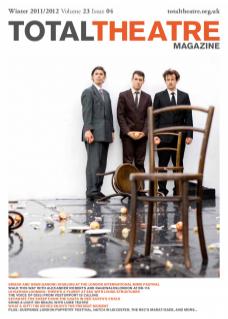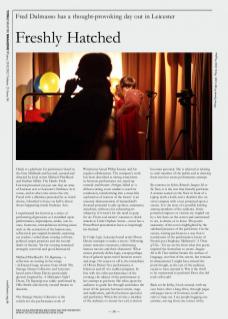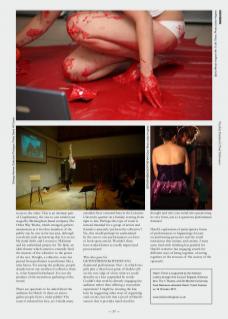Hatch is a platform for performers based in the East Midlands and beyond, curated and directed by local artists Michael Pinchbeck and Nathan Miller. The Hatch: Fresh Festival presented (on just one day) an array of fourteen acts at Leicester’s Embrace Arts venue, and at other sites across the city. Faced with a dilemma presented by so much choice, I decided to focus on half-a-dozen shows happening inside Embrace Arts.
I experienced the festival as a series of performing digressions as I stumbled upon preliminaries, impromptus, asides, one-to-ones, footnotes, interpolations skirting issues such as the extinction of the human race, collectively pre-empted homicide, maiming car crashes, verbal abuse coming to blows, political empty promises and the second death of theatre. Yet the evening remained strangely convivial and good-humoured.
Michael Pinchbeck’s The Beginning – a reflection on waiting in the wings – delineated stage recesses from which The Strange Names Collective and Leicesterbased artist Olwen Davies particularly glowed. Inspired by A Midsummer Night’s Dream, The Beginning was subtly performed by Ollie Smith and cleverly created theatre in absentia.
The Strange Names Collective is the vehicle for the performance work of Winchester-based Philip Stanier and his regular collaborators. The company’s work has been described as sitting somewhere in-between performance art, stand-up comedy and theatre. Prologue, billed as ‘a ribbon-cutting event unable to reach its conclusion, transforming into a maze-like exploration of notions of the future’ is an uncanny demonstration of humankind’s doomed potential to pile up facts, comments, anecdotes, without ever exhausting its subject(s), if it wasn’t for the need to gasp for air. From coal miners’ canaries to shark attacks to Little Orphan Annie – never has a PowerPoint presentation been so inspiringly far-fetched.
In Fridge Logic, Leicester-based artist Olwen Davies attempts to make a movie: ‘following classic narrative structures, referencing famous movies and their characters’. What ensues precisely defies logic, except perhaps that of galactic space travel between screen and stage. On screen or off it, the immediacy of Olwen Davies’ live performance is hilarious and all of a sudden poignant. In line with the other performances of the evening, the subject of the performance is her attempt to perform. She relies upon the audience to guide her through and makes the most of the porosity between screen, stage and auditorium, and that between spectator and performer. When she invites a member of the audience to answer her call, it almost becomes personal. She is talented at relating to each member of the public and at drawing them into her astute performance attempt.
By contrast, in Sylvia Rimat’s Imagine Me to Be There, it is the text that literally performs. A woman seated on the floor in front of a laptop (with a knife and a drumkit also on view) tampers with a text projected upon a screen. It is the story of a possible knifing among members of the audience. Some potential suspects or victims are singled out by a few lines on the screen and summoned to act, to drum, or to leave. The poetic autonomy of the text is highlighted by the subdued presence of the performer. On the screen, writing performs in a way that is reminiscent of the performative layout of French poet Stéphane Mallarmé’s A Throw of Dice... Yet we are far from what this poem inspired the Surrealists to create. Imagine Me to Be There neither breaks the surface of language, nor that of the screen, but remains bi-dimensional. I might have missed the point though, as the rest of the audience seems to have enjoyed it. Was it the thrill to be summoned to perform? Does this old trick still work?
Back to the lobby, I look around, with my eyes heavy after a long drive, through pages and pages waves of footnotes could not start to map out. I see people hugging one another, waving from one corner of the room to the other. This is an intrinsic part of Complimentary, the one-to-one rendezvous staged by Birmingham-based company The Other Way Works, which strangely gathers momentum as it involves members of the public one by one in the bar area, although everybody ends up knowing that it is an act. My mind drifts and I return to Mallarmé and his unfinished project for The Book, an ideal theatre which aimed to eternally bind the mystery of the collective to the power of the text. Tonight, a collective voice has passed from performer to performer like a relay baton. Yet among the audience, people already know one another; if collective there is, it has formed beforehand. It is not the produce of the mysterious gathering of the crowd.
There are questions to be asked about the audience for Hatch. Is there an aim to gather people from a wider public? The event is ticketed but free, yet I doubt many outsiders have ventured here in the Leicester University quarter on a Sunday evening from 6pm to late. Perhaps this type of event is instead intended for a group of artists and friends to precisely ‘perform the collective’? Yet, this would perhaps be undermined by the one-to-one performances you have to book upon arrival. Wouldn’t these have worked better as totally improvised provocations?
This also goes for GETINTHEBACKOFTHEVAN’s durational performance Oral – in which two girls play a three-hour game of double-talk on the very edge of a kiss: what we could describe as a kiss suspended by words. Couldn’t that work by directly engaging the audience rather than offering a voyeuristic experience? I might be crossing the line here by suggesting other ways of organising such events, but isn’t that a proof of Hatch’s success that it provides much food for thought and stirs your mind into questioning its very form, just as it questions performance formats?
Hatch’s exploration of participatory forms of performances or happenings focuses on performing processes and the social interaction they initiate and sustain. I went away tired with thinking but grateful for Hatch’s tentative but engaging search for different ways of being together, of acting together, in the recesses of ‘the society of the spectacle’.
Hatch: Fresh is supported by the National Lottery through Arts Council England, Embrace Arts, The Y Theatre, and De Montfort University. Fred Dalmasso attended Hatch: Fresh Festival on 16 October 2011.


